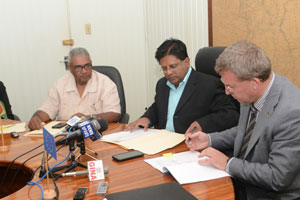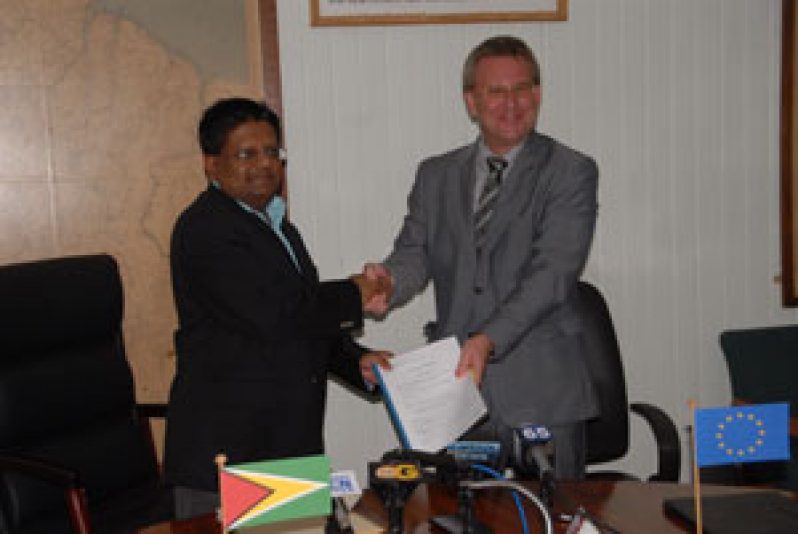FINANCE Minister Dr. Ashni Singh, on behalf of the Government of Guyana yesterday signed a €23.355M Financing Agreement with the European Union (EU) for the Guyana Annual Action Programme 2012 on Accompanying Measures on Sugar.
 This financing agreement will see the disbursement of €23.355M to aid the sugar industry’s development.
This financing agreement will see the disbursement of €23.355M to aid the sugar industry’s development.
This agreement, which was previously signed by Director for Latin America and Caribbean Directorate-General for Development and Cooperation, Ms. Jolita Butkeviciene, represents the latest instalment in a multi-year programme.
Making remarks at the signing ceremony, Dr. Singh expressed his deep satisfaction with the programme and what it has delivered to the sector to date, which he said represents a further demonstration of the strength and value of the EU/Government of Guyana relations.
He explained that this programme follows the changes made to the EU market for sugar, which resulted in the reduction of the guaranteed price that was enjoyed by sugar producers such as Guyana.
Dr. Singh further explained that as a result of this, they prepared a national action plan which is called the Guyana National Action Plan (GNAP) that identified interventions the government will implement to modernise and transform the sugar industry.
This, he said, formed the basis for support from the EU, through what is called accompanying measures.
“The European support through this accompanying measures programme has been extremely valuable and I wish to place on record the appreciation of the Government of Guyana and indeed of the people of Guyana for this support which is of course manifested in this current agreement,” he said.
According to Dr Singh, the history of sugar is almost the history of Guyana and in many respects “we are here as a country because of sugar.”
He noted that, not so long ago, the sugar industry formed the very backbone and foundation of the entire Guyanese economy.
DIVERSIFICATION
Dr. Singh pointed out, however, that Guyana has made considerable progress in diversifying the economy with the effect that no single industry now dominates overall economic performance.
“And that is a good development and it’s a direction in which we will continue to work to reduce our exposure to any single industry,” he added
Notwithstanding this, he said sugar is still very important to the country as a whole and to many communities in particular, and it continues to make an extremely valuable contribution to aggregate national output, the GDP and to economic life.
The Finance Minister gave assurance of the government’s firm commitment to the achievement of a competitive, viable, and profitable sugar industry, to which end it has, over the years, injected in excess of $40B to fund investments.
These investments, he pointed out, include major capital projects such as the Skeldon Sugar Factory and the Enmore Packaging Plant, as well as other less visible initiatives which are equally critical for the needed transformation of the industry.
Included in these less visible initiatives, he said, are investments in advancing the mechanisation programme, field conversion, and acquisition of equipment to advance mechanisation.
According to Dr. Singh, the leadership of the sugar industry and the agriculture ministry were integrally involved in the discussions leading up to the signing of this agreement, including in identifying realistic and attainable targets.
SUGAR INDUSTRY TURNAROUND PLAN
The leadership of the industry, he said, has much work to do to accomplish the turnaround which is much needed in the sugar industry.
He informed that the revised Strategic Plan 2013-2017 will be finalised by GuySuCo’s Board of Directors shortly and it is expected to fully address the plight of the industry and outline the measures that will foster its revival and survivability.
Dr. Singh assured that the government will continue to provide the requisite support and the necessary policy guidance and make the necessary policy decisions, but much will be expected and demanded of the board of directors and the management of the sugar industry.
These expectations, he said, include ensuring that the industry is placed on an appropriate trajectory, mostly in terms of production and profitability, and he encouraged all stakeholders to join them in that regard.
He assured the ambassador that Guyana will continue to support the industry and work with likeminded partners, such as the EU, who recognise the importance and potential of sugar in Guyana.
Meanwhile, Head of EU Delegation to Guyana, Ambassador Robert Kopecký urged the government of Guyana and GuySuCo to work diligently to meet the 2012 indicators to ensure that the entire sum earmarked for the programme is disbursed.
The ambassador also urged the government to continue modernising the industry and take up the marketing opportunities for raw sugar and its value-added by-products in the EU and elsewhere.
Making reference to President Donald Ramotar’s recent frank statements on Sunday last during the observance of the 65th anniversary of the Enmore Martyrs, the ambassador commended his willingness to engage all interested parties, which demonstrated that Guyana has every intention to have sugar regain its former glory days.
He further stated that the EU has always been fully cognisant of sugar’s multifunctional role in Guyana, being a key contributor to employment; rural stability; the national drainage and irrigation network; social services and Gross Domestic Product (GDP).
“The total amount allocated to the sugar sector under the Multi-Annual Indicative Programme [MIP] 2011-2013 is approximately Euro 74 Million. This amount is based on the European Commission’s decision on the indicative aid allocation to countries eligible for accompanying measures for former Sugar Protocol countries, for the period 2011-2013,” he explained.
The ambassador added that a few years ago, the EU changed its approach to development cooperation with Guyana from Project Support to Sector Budget Support.
According to him, only countries with mature and democratic systems can qualify for this type of assistance, since it places much of the onus on a government to manage development budgets efficiently as the funding is disbursed directly into the national treasury.
He related that it is estimated that more than 115,000 persons rely on the sugar industry for their livelihoods, whether as GuySuCo employees, private cane growers, suppliers or service providers, as well as their respective dependants.
“This is equivalent almost to a sixth of the population, a figure that underlines the central importance of the sugar industry in the economy and society of Guyana,” he declared.
Ambassador Kopecký assured that the EU remains committed to continue contributing to the achievement of Guyana’s national development goals, particularly as it relates to the restructuring of the sugar industry.
“During the period 2006-2012, the EU had disbursed 91.5M Euros towards the sector via Sector Budget Support while the government has provided other funds to GuySuCo since 2005 to fund its investment programmes with the company using its own resources to implement the reforms,” he pointed out.
He further stated that the EU takes pride in all that has been achieved in Guyana as a result of EU-Guyana development cooperation and also took the opportunity to point out that this is not the only sector receiving assistance from the EU in Guyana.
Ambassador Kopecký explained that they are also supporting the critical sea defence rehabilitation, civil society under the EU’s, ‘Non-State Actors and Local Authorities in Development’, thematic programme.
He noted, however, that there is always room for improvement, and the EU looks forward to the continued and successful collaboration with the Government of Guyana in the future.
The ambassador also welcomed the launching of a new strategy for the sugar sector which demonstrated the government’s commitment to bring the industry back to a position of sustainability, competitiveness and profitability.
This 2012 Financing Agreement builds on previous programmes under GNAP with due consideration to the recent and current exigencies which have beset the sugar industry.
The industry has to meet a series of specific conditions in investments and performance in areas including replanting, land conversion, mechanical harvesting, drainage works and factory improvement.
In addition, the Ministry of Finance must meet the general conditions of stability oriented macro-economic conditions, and implementation of reforms to further improve Public Financial Management.
Also witnessing the signing of the agreement were Deputy National Authorising Officer (NAO), Mr. Tarachand Balgobin; NAO Task Force Team Leader Mrs. Nisa Surujbally; and Programme Officer at the EU Delegation Ms. Susana Fernández Rodríguez.



.jpg)









